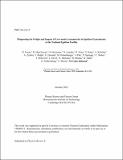Diagnosing the Origin and Impact of Low-mode Asymmetries in Ignition Experiments at the National Ignition Facility
Author(s)
Casey, D.; MacGowan, B.; Hurricane, O.; Landen, O.; Nora, R.; Haan, S.; Kritcher, A.; Zylstra, A.; Ralph, J.; Dewald, E.; Hohenberger, M.; Pak, A.; Springer, P.; Weber, C.; Milovich, J.; Divol, L.; Hartouni, E.; Bionta, R.; Hahn, K.; Schlossberg, D.; Moore, A.; Gatu Johnson, Maria; ... Show more Show less
Download23ja015_full.pdf (1.138Mb)
Metadata
Show full item recordAbstract
Inertial confinement fusion ignition requires high inflight shell velocity, good energy coupling between the hotspot and shell, and high areal-density at peak compression. Three-dimensional asymmetries caused by imperfections in the drive symmetry or target can grow and damage the coupling and confinement. Recent high-yield experiments have shown that low-mode asymmetries are a key degradation mechanism and contribute to variability. We show the experimental signatures and impacts of asymmetry change with increasing implosion yield given the same initial cause. This work has implications for improving robustness to a key degradation in ignition experiments.
Description
Submitted for publication in Physical Review E
Date issued
2023-10Department
Massachusetts Institute of Technology. Plasma Science and Fusion CenterJournal
Physical Review E
Publisher
APS
Other identifiers
23ja015